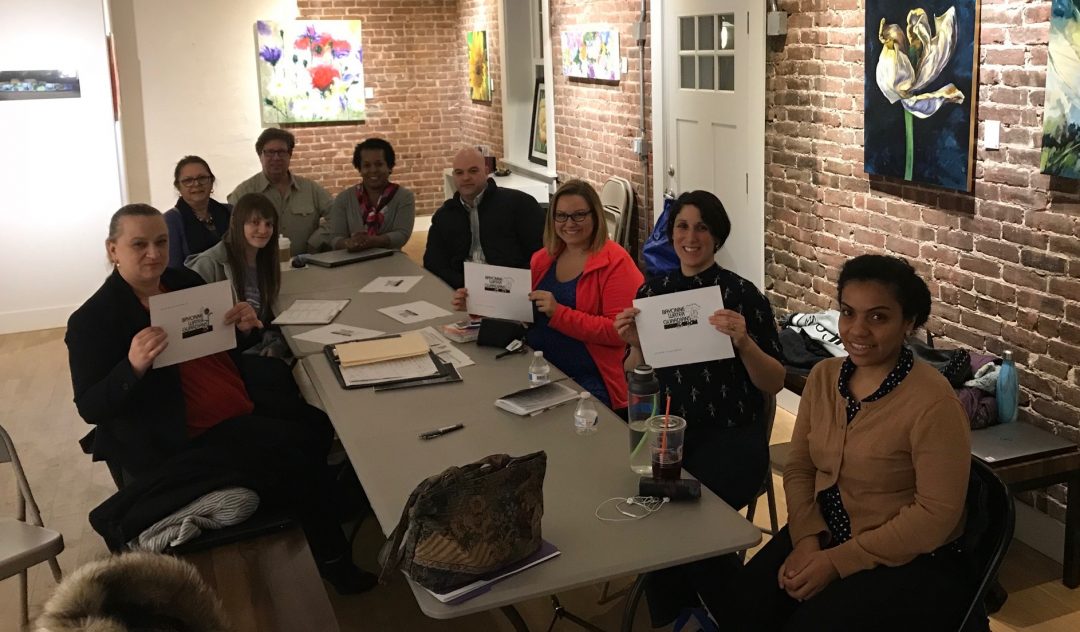All of New Jersey’s combined sewer overflow permit holders are required to conduct public outreach. But what does good public outreach look like? The Sewage-Free Streets and Rivers Advisory Committee is making recommendations to the permit holders on how to engage the public in the evaluation of alternatives.
On July 1, 2019, New Jersey combined sewer overflow permit holders will submit what are known as Development and Evaluation of Alternatives Reports, which will review the options they are considering using in their plans to stop combined sewer overflows. (The final plans are due on July 1, 2020.) This is a critical point in the development of these Combined Sewer Overflow (CSO) Long Term Control Plans (LTCPs), and the permit holders should gather input on the alternatives from the Supplemental CSO Teams and the public prior to submitting the evaluation reports to the NJDEP.
Supplemental CSO Teams are groups of stakeholders that permit holders were required to establish as part of the CSO permits. These teams are intended to be a resource to permit holders to enable them “to better develop an outreach program that reaches a broad base of citizens” (Forming and Utilizing Your CSO Supplemental Team). The permits allow team members to provide input on the evaluation of CSO control alternatives, the selection of the CSO controls, and the planning process.
At the March 7 Passaic Valley Sewerage Commission Supplemental CSO Team meeting, Bayonne, East Newark, Guttenberg, Jersey City Municipal Utilities Authority, and Bergen County Municipal Utilities Authority gave presentations options they are considering to reduce sewage overflows. Unfortunately, a number of supplemental team members were not in attendance, and there was insufficient time available for feedback from supplemental team members on how best to communicate this information to the general public.
The Sewage-Free Streets and Rivers Advisory Committee, which includes several members of the regional supplemental team, sent a letter to the permit holders that presented at the March 7 meeting with recommendations on how best to inform and engage a broad range of citizens in the evaluation of alternatives, including:
- In addition to the March 7 meeting, permittees should hold dynamic public workshops in their municipalities that engage the public in a discussion about the alternatives, rather than being just a one-way presentation of the alternatives being evaluated to reduce combined sewer overflows.
- Additional workshops should be proposed to local groups, such as green teams and environmental commissions, as should a presentation at City Council meetings. Interactions with the public should be tailored for a lay audience and focus on effectiveness, cost, combinations of solutions, and potential disruptions rather than high-level technical engineering specifics.
- Permittees and consultants working on the plans should detail what they considered in their evaluation of green infrastructure and community benefits. If using small-scale samples such as the Rutgers University/PVSC’s Green Infrastructure Feasibility Studies, permittees and consultants should communicate clearly that the study is a preliminary analysis of low-hanging-fruit projects and then detail how the permit holder will build upon this first effort for the larger purpose of the LTCP alternatives analysis.
- Permittees should focus on the information that is most critical to the public, such as flooding, floatables (e.g., litter), public access to waterfronts, affordability, green infrastructure, workforce opportunities and water quality. Presentations should begin with what will affect the public the most and at a very local level. Much of the information that was presented on March 7 was less critical for the public and diluted the purpose of communicating this information to a general audience.
- Presentations should include general information on the CSO permit that focuses on the process and purpose of the public’s involvement in the alternatives analysis and the implementation of the LTCP.
- Presentations should include sufficient time for the public to ask questions and time for the permittee to ask the public questions.
The Sewage-Free Streets and Rivers Advisory Committee also supports the the following recommendations on general public outreach that several Municipal Action Teams submitted to permit holders last year to assist with community outreach:
- Designate consistent dates and times for public meetings
- Provide an agenda for each meeting at least one week in advance
- Develop a publicly accessible online platform for sharing meeting materials, including presentations, meeting schedules, agendas, documents produced under the CSO permit, fact sheets and other educational material
- Provide multilingual information on the initiative, including fact sheets and points of contact for additional information
- Presentations by all parties should explain clearly any technical jargon and quantitative data
- Establish a feedback-loop communication model, where there is a clear route through which the public and the permittees can share information and comments, and indicate how this feedback is being incorporated into the resulting plans
- Provide not just a timeline of the permit deliverables, but also indication of where there is opportunity for public comment within that timeline, and
- Release key documents (e.g. Alternatives Analysis, etc.) in draft form, with enough time for meaningful public comment before they are finalized
Download the Sewage-Free Streets and Rivers Advisory Committee letter

